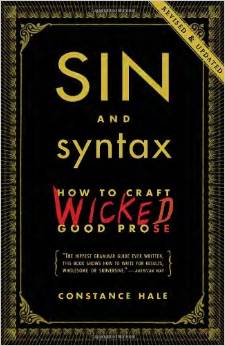18 May 2014
"When you catch an adjective," Mark Twain supposedly wrote to a twelve-year-old boy, "kill it. No. I don't mean utterly, but kill most of them—then the rest will be valuable."
Constance Hale invokes a slew of such—from Julius Caesar to rap artists, in her advice to those of us who are determined to go-forth-and-sin-no-more against readable writing. Her Sin and Syntax: How to Craft Wickedly Effective Prose (New York: Broadway Books, 1999) breaks down writing sins into everyday issues of 'flesh, bones, and carnal pleasures.' EE will let you discover for yourself which of these categories each of the following falls into:
- "The most common and comical sin is called the Dangling Participle." (Amen!)
- "The principal sins with conjunctions are sins of omission—pasting choppy pieces together without any artful seaming."
- "More than any other part of speech, it is the verb that determines whether a writer is a wimp or a wizard." Novices tend to rely on 'is' and other static verbs and lose momentum by stumbling into the passive voice. ... Pros make strong nouns and dynamic verbs the heart of their style. ... Some writers devote one entire rewrite to verbs, circling every 'is' and 'are' and trying to replace as many as possible. Eventually, dynamic verbs will start flowing from the get-go."